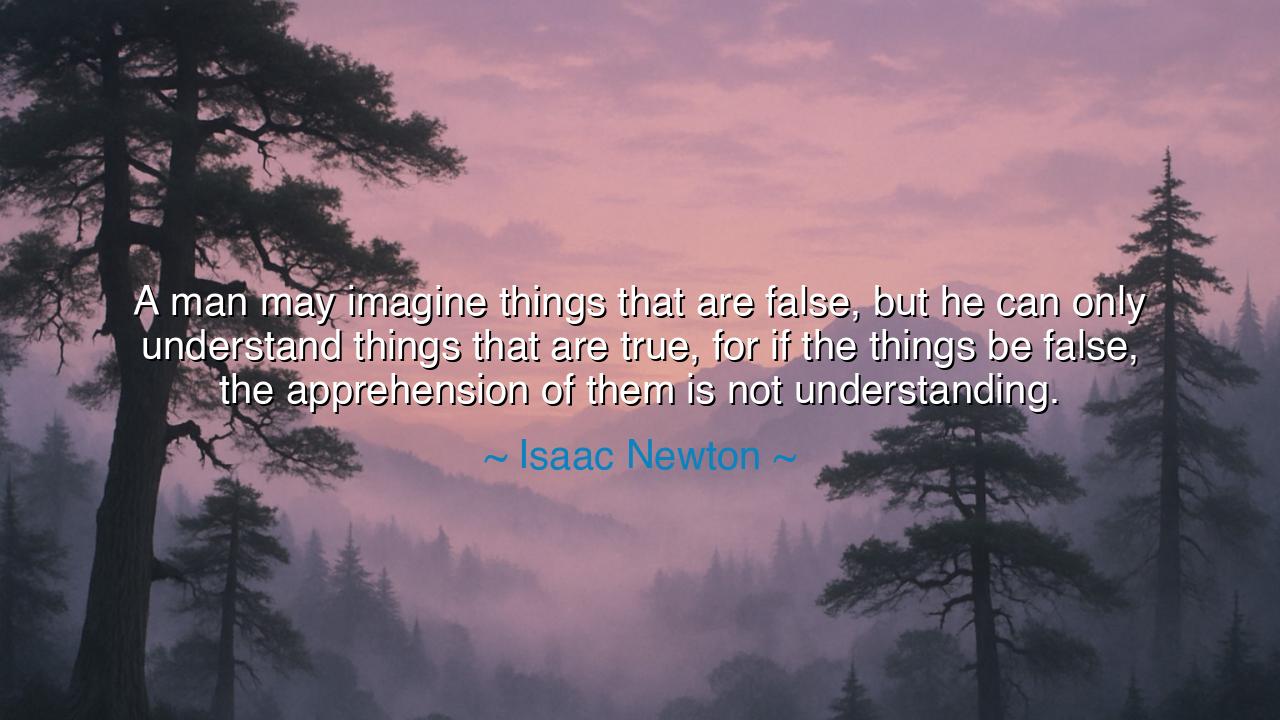
A man may imagine things that are false, but he can only
A man may imagine things that are false, but he can only understand things that are true, for if the things be false, the apprehension of them is not understanding.






In the words of Sir Isaac Newton, that great seeker of celestial truths, we find this immortal reflection: “A man may imagine things that are false, but he can only understand things that are true, for if the things be false, the apprehension of them is not understanding.” These words are not mere philosophy; they are a flame of wisdom passed from one who gazed into the mysteries of nature and beheld the divine order of truth itself. Newton speaks not only as a scientist, but as a prophet of reason — declaring that while the mind may wander into illusion, the spirit of understanding can rest only upon truth.
In these words lies a distinction profound as the heavens and the earth. Imagination is the wind that carries the mind through realms unseen; it gives birth to dreams, myths, and fears alike. Yet understanding is the light that reveals what truly is — not what seems to be. One may imagine the stars as gods, or the thunder as the wrath of Zeus, but one can only understand the stars when he beholds their laws, their harmony, their silent music in the cosmos. Thus, Newton reminds us that falsehood, though it may glitter like gold in the dark, has no weight in the realm of the eternal. Only truth can anchor the soul.
Consider the tale of Galileo Galilei, that fearless observer who turned his gaze to the skies when all the world preferred the comfort of falsehood. Many imagined that the Earth stood immovable, that the heavens revolved around it in divine perfection. But Galileo, guided not by imagination but by understanding, dared to say, “And yet it moves.” For this truth he was condemned, silenced, and shunned — yet the centuries have vindicated him. The world remembers not the names of those who denied him, but honors the one who chose truth over illusion. From this we see: imagination may charm the crowd, but only understanding endures through the ages.
Newton himself was no stranger to this perilous path. In his solitude, amidst candlelight and calculation, he imagined many things — forces unseen, movements imperceptible, the invisible hand that binds apple and planet alike. But his genius was not in imagining; it was in discovering that which was true. He understood that false ideas, however elegant, dissolve when tested by the fire of reality. His discoveries — the laws of motion, the pull of gravity, the prisms of light — are not dreams, but revelations of the universe’s own language. Thus he bridged the realm of imagination with the realm of truth, showing that to understand is to see with the eye of nature herself.
The heart of this teaching burns still: there is a sacred difference between knowing and believing, between seeing with the mind and seeing with the soul. To understand is not to accept blindly, nor to be swayed by the glitter of words or the authority of men. It is to hold a thing up to the light and ask, “Is this real?” And if it is not, to cast it aside, however beautiful it may seem. For falsehood, no matter how ornate, is but shadow — and only truth can give substance to the human spirit.
Let each of us, then, be like the seekers of old — like Archimedes crying “Eureka!” in the streets, or Hypatia teaching in defiance of ignorance, or Newton himself, who said he was but a child picking pebbles on the shore of the great ocean of truth. We too must seek, question, and test, for understanding does not come as a gift — it is earned through labor, humility, and courage. To understand is to kneel before reality and accept it as it is, not as we wish it to be.
Therefore, the lesson is clear: Guard your imagination, but worship your understanding. Let imagination be the seed that inspires, but let truth be the soil in which wisdom grows. When you hear a claim, ask for its proof. When you feel certainty, challenge it. And when truth stands before you, though it may humble your pride or shatter your illusions, embrace it — for in that embrace lies the only true freedom of the human mind.
So walk through life not as one drunk on dreams, but as one awake to the splendor of what is real. Let your heart imagine, but let your mind discern. For as Newton taught, the false may dazzle for a moment, but only the true endures — and to understand truth is to touch eternity itself.






AAdministratorAdministrator
Welcome, honored guests. Please leave a comment, we will respond soon